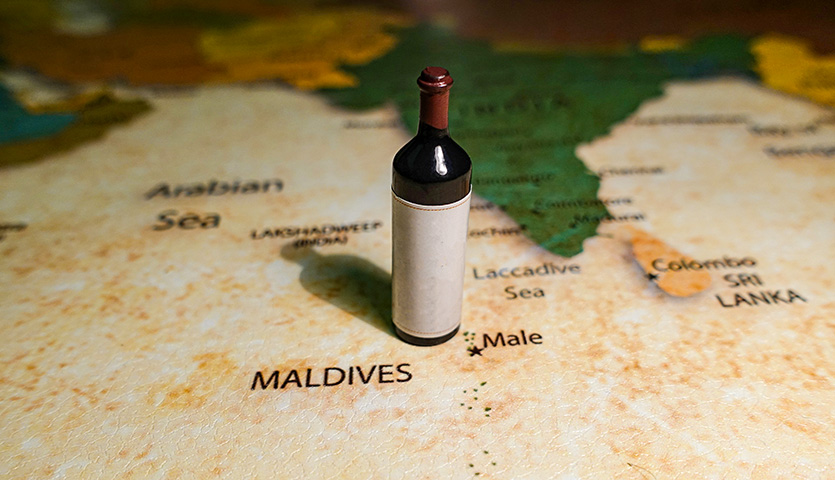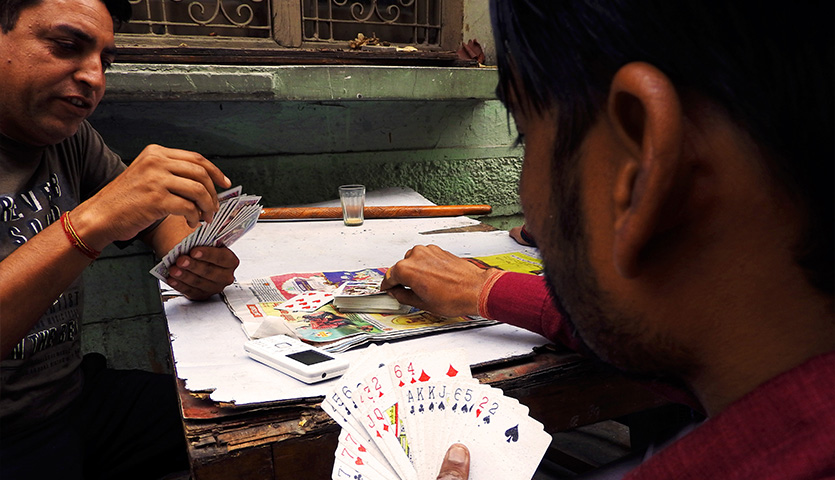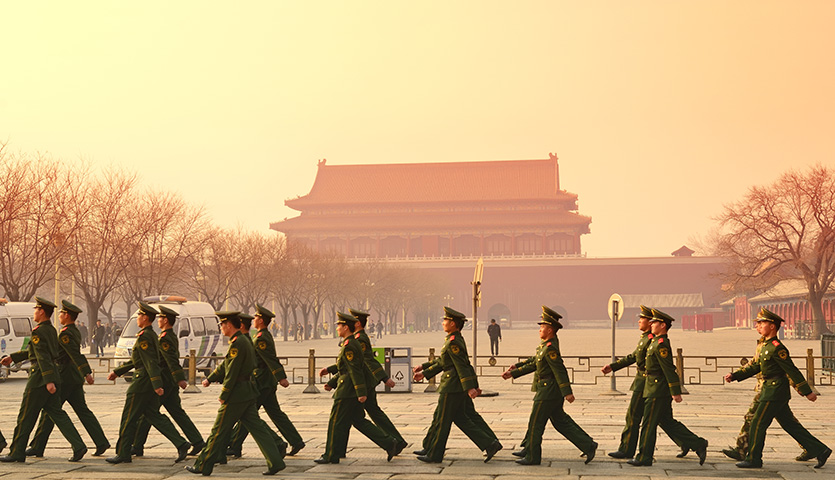Traveling can be an incredibly freeing experience, but that doesn't necessarily mean you're free to do whatever you want. Tourists often find themselves in hot water with locals or law enforcement for being ignorant of laws or cultural norms.
At best, this can be embarrassing. At worst, illegal. Switching into relaxation mode is essential for most vacations, but don't let it make you blind to some crucial information about your destination. Try making a must-not-do list in addition to your to-do list. In some places, chewing gum is illegal. In others, throwing out your metro ticket breaks the law. Here are a few weird laws to watch out for.
Feeding the Pigeons in Venice
Throwing birdseed in Venice's Piazza San Marco may seem like an innocent pastime, but Venice has banned feeding the city's massive pigeon population. Some people do still feed the birds, but the practice is punishable by a fine since the pigeons damage statues and require cleanup.
Pigeons perching on seed-throwing tourists used to be the square's trademark, but if you want to stay on the city's good side and avoid getting pooped on (even though it is, surprisingly, considered good luck), opt for wine at a patio and watch the birds milling around instead. That sounds more appealing anyway.

RELATED: 10 Things Locals Want You to Know About Venice.
(Photo: Thinkstock, iStock)
Taking Gum to Singapore

The import of chewing gum has been illegal in Singapore since 1992 due to the damage it caused to the public transit system. While your bubblegum may seem harmless, Singapore's government says the nation spent $106,000 (US) per year cleaning up gum litter and damage before the ban, and can punish those caught importing or selling gum with a fine or even jail time.
Some gum is now permitted for "therapeutic" purposes, i.e. nicotine gum and sugar-free gum with dental health benefits, but sugary bubble gum is still a no-go.
Bringing Dirty Magazines and Alcohol to the Maldives
A primarily Islamic country, many people think the Maldives bans bringing in non-Muslim religious material like the Bible. This isn't true: Only religious icons like statuettes are banned by customs.
But the country does impose a ban on bringing in pornographic material and alcohol. That includes sex toys and liquor sold duty-free past airport security, so leave those items behind unless you want to risk an embarrassing bag search and possible fine.

RELATED: 10 Strangest Sex Laws in the USA.
Having Drugs in Southeast Asia

Southeast Asian countries like Bali, Malaysia, Singapore, and the Philippines have notoriously harsh drug laws. This is likely due to trafficking problems that come from the Golden Triangle, an area bordering Thailand, Laos, and Myanmar that produces the world's largest amounts of illegal opiate drugs.
Tourists have famously fallen victim to these laws whether they're carrying drugs intentionally or accidentally. An Australian model, Michelle Leslie, faced 15 years of prison time in 2005 after police said she brought two ecstasy tablets into a Bali club. Leslie was released, but other traffickers have been executed for similar drug offenses. Avoid unknowingly becoming a drug mule and never purposely travel with illegal substances.
Gambling in India
There's a somewhat common misconception that playing cards outside is illegal in India. This probably comes from the fact that in the majority of the country, gambling is banned, and playing cards for money could be considered a form of gambling.

If you come across or engage in a harmless game of Black Jack or poker while visiting, be sure not to wager any money or anything that could be a stand-in for currency, like marked poker chips. The game could cost you a hefty fine or up to three months of jail time.
RELATED: What Not to Do in Las Vegas.
Tossing Out Your Metro Ticket in Cities Like Paris and Madrid
The consequences for throwing out a metro ticket in some cities prove that ignorance truly isn't an excuse to get out of breaking the law. Tourists-especially those who don't speak the local language and can't read posted warnings-sometimes report finding themselves ambushed by Metro police and unable to exit public transit stations without paying a fine. Why? Because they threw out the single-trip ticket that gained them access, thinking they wouldn’t need it to exit the underground. While that little ticket may seem useless after it gains you access to the train, you may need it to exit or to prove you didn't hop a turnstile.
To prevent this debacle from happening, buy a weekend-long metro card or a multi-trip ticket rather than the single-use ticket. The exit fine for not keeping or losing your single-trip slip could break your budget if you're busted, and multi-ride cards usually end up saving you money anyway.
(Photo: Thinkstock, iStock)
Dissing the Government in China
China is a beautiful destination with an incredibly rich history, and it also has a government that differs greatly from many Western nations in terms of privacy and public knowledge.

A group of South African, British, and Indian nationals were recently arrested and then deported from China, accused of having "terror links." The tourists, however, said they were arrested for watching a documentary about Genghis Kahn, the conqueror who led the Mongol invasion of China in the 1200s. The Chinese government called the video the tourists watched in their lodging "propaganda" and arrested all of them.
While this is likely a rare case, remember to research the government and legal structure of your destination, and know a little bit about its history to avoid offending people who have the power to ruin your trip.
RELATED: Walking the Great Wall of China.
Expecting to Use Airbnb in Some Cities
Traveling at the last minute is often a fun, worthwhile adventure if you find the perfect airfare option for a steal. But don't depend on readily accessible last-minute lodging, especially if you're on a budget.

Airbnb is largely illegal in some cities, including New York, Santa Monica, and Paris. Hosts need to have permits to host travelers in these places, which means Airbnb availability could be low or virtually non-existent.
Look at your options ahead of time, even if it's the day before your arrival. If you're really in a pinch, you can take advantage of super quick hotel options like Hotel Tonight, an app that fills still-vacant hotel rooms at the last minute. It's important to have a back-up plan.
Wearing Camouflage in Barbados
Only members of the military are permitted to wear camouflage in Barbados, and it's surprisingly not just because it's a crime against fashion. The ban was enacted in the 1980s to prevent gang members from impersonating soldiers and robbing people. That's not as much of a problem these days, but the law still remains and offenders can be fined.
(Photo: Thinkstock, Purestock)
Kissing in Dubai and Abu Dhabi

Tourists visiting the United Arab Emirates should be aware that the nation's public decency laws differ greatly from those of Western countries. Publicly kissing and/or touching your significant other can land you in jail, as this British couple learned in 2013. Hefty fines can also be imposed, so make sure you remember to keep your hands and lips to yourself while exploring Dubai or Abu Dhabi.
RELATED: Really Weird Romantic Traditions Around the World.
(Photo: Thinkstock, iStock)
Going Out Beach-Ready in Barcelona
While Barcelona is home to two nude beaches, the city itself doesn't share the lax decency rules of even a standard public beach. Going in public wearing only a bathing suit-bikini or swim trunks-is illegal in the Spanish city, and could result in a fine as well as lots of looks from offended locals. Make sure to cover up before you leave the beach, even if it's not one of the nude ones.
(Photo: Thinkstock, iStock)
More from SmarterTravel:
8 English Words You Should Never Use Abroad
Crazy Driving Laws Around the World
10 Super Weird Laws from Around the World
Like this story? Join the 1 million other travelers who read our free Deal Alert newsletter. It's full of our best tips, trip ideas, and travel deals. Subscribe here today.
Read the original story:11 Weird Laws That Could Ruin Your Next Trip by Shannon McMahon, who is a regular contributor to SmarterTravel.





